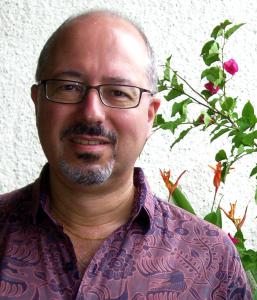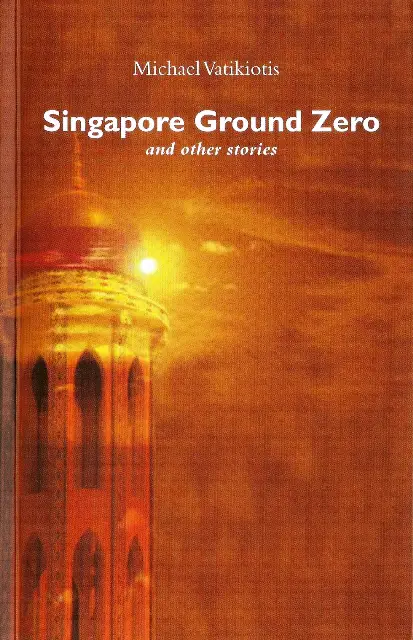 Michael Vatikiotis is a Singapore-based writer and journalist of Greek and Middle Eastern heritage. He is an expert on matters relating to Southeast Asia and has worked as a journalist in Asia for over twenty years. His fiction includes Debatable Land (Talisman, 2001), his first collection of short stories, The Spice Garden (Equinox, 2003), a novel set in Indonesia and based on true accounts of religious violence, and Singapore Ground Zero and Other Stories (Talisman, 2007), his second collection of short stories. In this interview, he talks about the Muslim world, his writing, mass media, and books.
Michael Vatikiotis is a Singapore-based writer and journalist of Greek and Middle Eastern heritage. He is an expert on matters relating to Southeast Asia and has worked as a journalist in Asia for over twenty years. His fiction includes Debatable Land (Talisman, 2001), his first collection of short stories, The Spice Garden (Equinox, 2003), a novel set in Indonesia and based on true accounts of religious violence, and Singapore Ground Zero and Other Stories (Talisman, 2007), his second collection of short stories. In this interview, he talks about the Muslim world, his writing, mass media, and books.
Voicu Mihnea Simandan: In Singapore Ground Zero, you describe, without taking sides, “the good, the bad and the ugly” of Islam. Why is this collection of short stories important and relevant for readers?
Michael Vatikiotis: I felt strongly at the time that the whole discourse on militant Islam was relatively unexplored in the creative writing context. The narrative has been determined to a great extent by those who live in fear of terrorism, and less by those on the other side of the ideological fence. Having lived in Indonesia and Malaysia for some years I was confident I could reflect on the rise of Islamic consciousness through the short story medium. In “Scarface at Ground Zero” I have observed the paranoia about Muslims generated in the wake of the 9/11 attacks through the eyes of a young Indonesian student in New York. In “Singapore Ground Zero” I explored the world of fear generated by the Singapore government in the mind of an ordinary civil servant. I was fascinated by the remarkable level of paranoia and the fear generated by this single attack – not that terrorism was a new phenomenon. For perspective, I found it useful to re-read Joseph Conrad’s seminal novel The Secret Agent, which is all about a terrorist in a long-forgotten earlier age of terror.
VMS: In the short story “A Rebel to Remember,” you write that the south of Thailand “is the meeting point of two dramatically different peoples, the Buddhist Thai and Muslim Malay.” It’s been years now since these people have taken their differences to a violent stage and thousands have died and have been wounded. Will we ever see a ‘normalization’ of life in the south?
MV: Southeast Asia is home to a patchwork of internal conflicts that have smoldered for decades without end. Southern Thailand is among the more virulently active at this moment in time. It is possible that either the violence dies down without a solution – only to erupt again some years from now. Or there will be some visionary change of policy that will grant the Malay Muslims of the three Southern Border provinces more of a say in how they govern their lives. It will take a long time however to rid the region of the smuggling and criminal activity that is responsible for a great deal of the violence.
VMS: The human and financial cost of the Muslim insurgency in the south of Thailand has been great, but still, people living in Bangkok and further up north, don’t seem to care that much. The pressure on the government to ‘settle the dispute’ is nowhere near what it should be!
MV: Thailand is not alone in failing to prioritize the resolution of internal conflict. Indonesia waited three decades before resolving the conflict in Aceh! The Philippines is home to the oldest continuous Communist uprising, and in Burma the Karens have been fighting for independence for 60 years!
VMS: The Middle East and the countries of North Africa are going through a tumultuous period of transition to a more democratic society. Is it plausible that countries in Asia, in general, and Southeast Asia, in particular, will become the stage of similar ‘revolutions’?
MV: I do not see an obvious parallel in SE Asia. The Arab world is united at a popular level by a common language, which conducted sentiments of revolt across the region at lightening speed. The only common language in SE Asia is English, which is spoken mainly by the conservative elites with a common desire to protect the status quo. Thus the earlier democratic transition in Indonesia over a decade ago had no galvanizing effect on neighbouring Malaysia or Myanmar.
 VMS: In Singapore Ground Zero you succeed in avoiding taking sides. Unfortunately, this usually does not happen in local and international mass media. How important do you think it is for big mass media consortiums to present facts as they are, without ‘adjusting’ them to suit their own agenda?
VMS: In Singapore Ground Zero you succeed in avoiding taking sides. Unfortunately, this usually does not happen in local and international mass media. How important do you think it is for big mass media consortiums to present facts as they are, without ‘adjusting’ them to suit their own agenda?
MV: Media opinion is largely shaped by the politics of its ownership. This is unchanging in the mainstream print media.
VMS: Social media applications, such as Facebook and Twitter, have become important tools in mobilizing people to fight for justice and their rights. Where do you think this will take us in the near future?
MV: I am convinced that social media has a cathartic effect on popular political struggle. It is to begin with less easy to censor. If you shut down a newspaper or magazine, business can continue as usual. If you shut down the Internet it can’t. In a recent article I wrote on Democracy in SE Asia I highlighted the role social media is playing not only in mobilizing popular protest, but also in ensuring that the messaging is consistent, which helps build stronger constituencies for change.
VMS: What book are you working on right now? When will it be published?
MV: I recently finished a novel about a young painter from Central Java and his journey to social awareness and political liberation. It is in search of a publisher. Unlike India, Indonesia is not a popular subject for modern publishers in the English language so this will take time.
VMS: With the rise in popularity of e-book readers, where do you see traditional publishers in a decade’s time?
MV: Online or out of business.
VMS: Thank you for your time. I’m looking forward to reading your next book.
Voicu Mihnea Simandan
Bangkok, Thailand
April 3, 2011

